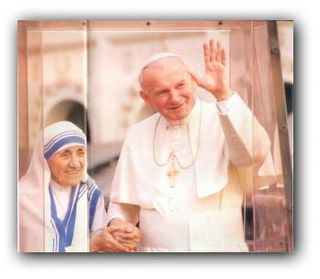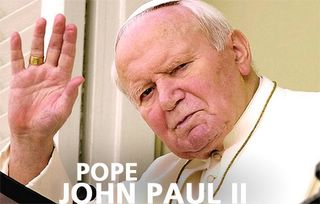Parishioner's Letter to Fr. Brum.
On April 11, 2005 the following letters were hand-delivered to Fr. Louis Brum and delivered by certified mail to Bishop Raymundo Peña.
Fr. Louis contacted Mark Peña on the afternoon of April 15, 2005 and a meeting was scheduled for May 4, 2005. Fr. Louis has communicated his need to reschedule this meeting. The rescheduled meeting date is pending.
April 11, 2005
HAND-DELIVERED
Fr. Louis Brum
Holy Spirit Catholic Church
2201 Martin Avenue
McAllen, Texas 78504
Dear Fr. Louis,
Enclosed is a letter that has been signed by over 250 parishioners of Holy Spirit Parish. This letter expresses a set of concerns regarding our parish, and requests that you meet with us and other representatives of the signing parishioners.
We request you please contact us by 5:00pm on Thursday, April 14th, to arrange a meeting. If we do not hear from you within this time, we will contact Bishop Peña to arrange a meeting with him to address these concerns. A copy of the enclosed letter with the parishioners’ signatures has also been sent to Bishop Peña.
We anticipate hearing from you so that together we may move our parish forward in a positive direction. Please contact Mark Peña at work at 383-4951, or contact Mark and Michelle Peña at home at 380-3731.
Sincerely,
Mark & Michelle Peña
cc: Most Reverend Bishop Raymundo Peña
A Letter to Our Pastor from Parishioners of Holy Spirit Parish.
Dear Father Louis:
Bishop Peña addressed our Parish in February 2003 with the following words:
“(You have built) a dynamic, progressive Vatican II parish in every respect – spiritually vibrant, financially solvent and generous with many outstanding charitable endeavors, many active volunteers in a wide variety of programs, extensive participation of members in educational and renewal programs, a large number of small church communities … and a strong prophetic voice in the larger community.”
These words seem particularly hollow in light of what has transpired since then and have left us feeling betrayed and abandoned by our Bishop and some of our diocesan clergy. The unfair treatment and termination of our parish employees was extremely troubling to each of us. We felt as though a dagger had been struck through the heart of our parish.
We love our Church, and we are committed to our parish community. We continually pray for our parish, and we wish to move forward beyond the hurt and help heal the wounds of the past. In this spirit of healing and reconciliation, we believe it is necessary to share with you as our Pastor our deep felt concern regarding the following matters that have come to our attention and which we believe are resulting in further harm and division within our parish community:
· You have disallowed some parishioners from participating in parish ministries.
· You have not met with the union representative of the parish workers.
· You have not permitted the Parish Council to meet and provide advice and input regarding Church matters.
· The financial crisis in the parish, which will see at least a $100,000 shortfall for the year, is not being addresses.
· The Finance Committee is not being administered properly.
· The Worship Committee was disbanded and numerous liturgical changes have been made which are contrary to the traditions of our parish.
· Sister Moira was removed from the Peace and Justice Commission, and the scope of the Commission's activities has been severely limited, including the discontinuation of Affirmation Night.
· An atmosphere in which diversity of opinion is not accepted has been created in the parish.
· You are often unavailable to parishioners and staff.
· The church staff is not being allowed to carry out its duties free from unnecessary interference.
· The underlying hurt and resentment created by the events of June 18, 2003 when the employees were fired and the parish was thrown into turmoil are being ignored.
In the spirit of love and cooperation, we ask you, as our Parish leader, to support and develop the relationship of support and dependence between laity and clergy as declared in the Vatican II Document Lumen Gentium #30. “It is the noble duty of pastors to recognize the services and charismatic gifts of the laity. Pastors are not meant to shoulder alone the entire saving mission of the Church toward the world."
We stand ready to help shoulder the yoke with you and ask for the opportunity to share in the work of our Church. We ask you to enable parishioners to fully participate and to accept our diverse opinions. We ask to be allowed a voice and to give input and advice in a canonically established parish council and to feel secure that dissenting words can be expressed without fear of retribution.
We want to help you in building up the Parish’s “strong prophetic voice in the larger community” that our Bishop praised. We seek to continue to answer the gospel’s call to bring justice. We ask that you reconsider your decisions to severely limit the scope of the Peace and Justice Commission and its coordinator.
We ask you to support our desire for the Eucharist to be the center of our lives and for our liturgies to reflect and include liturgical traditions and rituals developed and cherished over so many years by this parish.
We ask you to work with parishioners in returning our parish to financial stability. We wish to answer our Pope’s call to “shared responsibility” in meeting the financial crisis of the Church and to participate in the Finance Committee. We feel it is imperative that this committee be allowed to fulfill its canonical requirements and meet our present financial crisis with transparency and confidence.
We ask you to stand with the Church’s history of compassion for the worker and help us resolve the issues surrounding the treatment of our parish staff. We ask that you meet with the authorized union representative of our parish employees and insure that the employees are treated fairly and with dignity and respect.
We ask you to be present with us. We need your presence in our parish, its services and its office. We deeply desire healing, and to be known by our pastor and to know him. We want to build our relationship with you, but find it is difficult to do so when you are away from the parish so much of the time.
We want to continue to be a “dynamic, progressive Vatican II Parish.” We are committed to make every effort to resolve these concerns with you as our Pastor. We ask that you please meet with us to discuss these concerns and formulate plans for their cooperative resolution. We pray for you and that through God’s grace we can bring peace and healing to our parish.
You may contact Mark and Michelle Peña in Edinburg.
Signature Pages Attached.
Note: If you would like to contribute a posting or a comment to this site, please send it to: kanickers@aol.com, with "Holy Spirit" in your title line. You may also e-mail this article to a friend, simply by clicking on the little envelope icon below!








